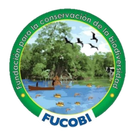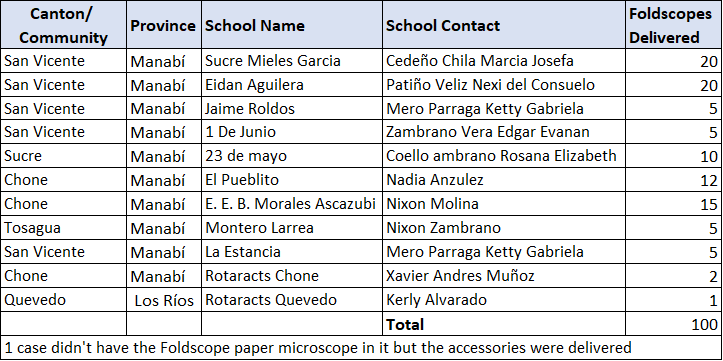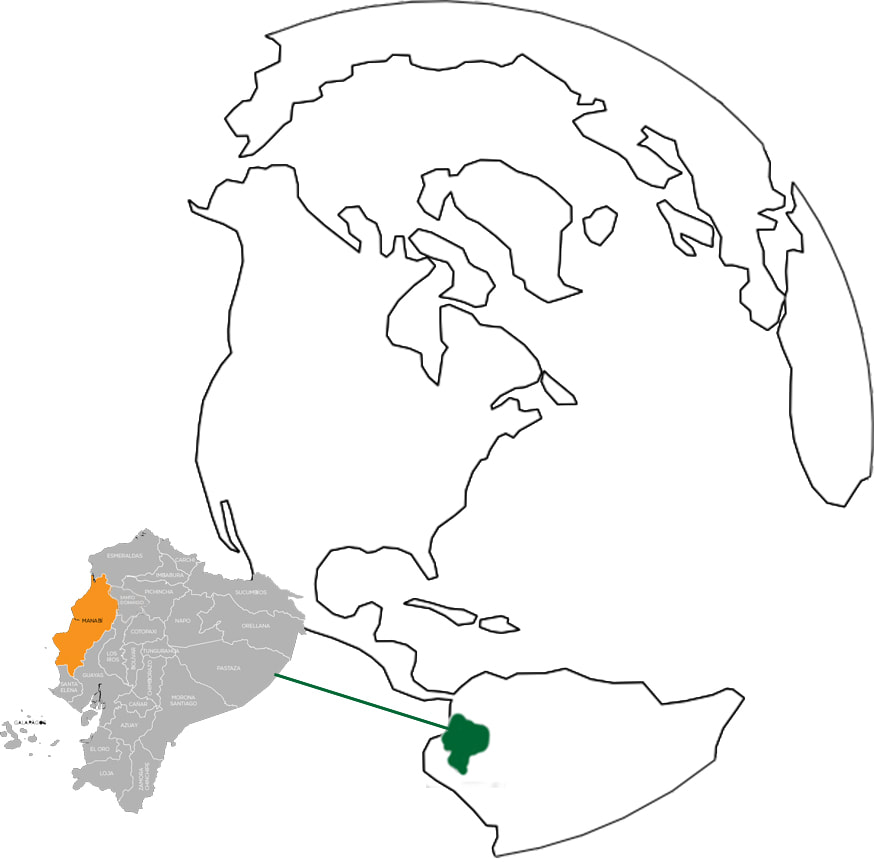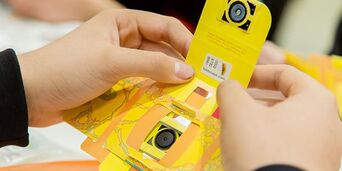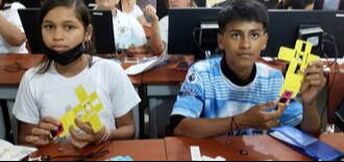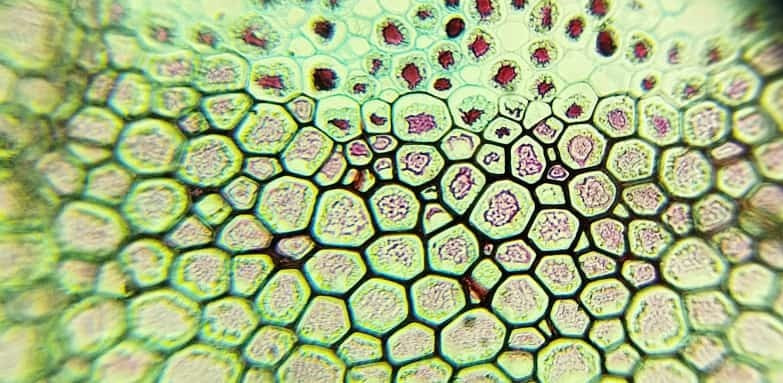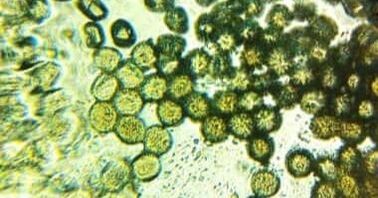Portovelo Community-Manabí
A total of 100 foldscopes donated by the Rotary Club of Southborough were distributed in the province of Manabí to 9 schools located in the mangrove communities of the Rio Chone estuary, and to two Rotaract groups: Chone and Quevedo.
|
Our team: Miriam Alcívar-president of the FUCOBI foundation; Dr. Acacia Warren, program coordinator of “UNA SALUD / ONE HEALTH Epigenomics & Microbiomes: Somos lo que comemos / We are what we eat”; César Díaz, volunteer of the FUCOBI Foundation; Iris Hernández, executive director of the FUCOBI Foundation, with the support of the Rotary Club of Chone, Dr. Christopher Puttock of Rotary International and two volunteers from Rotaract Chone and a volunteer from Rotaract Quevedo travelled to the community of Portovelo where they were welcomed by the authorities from the protected area “Isla Corazón y Fragata Wildlife Refuge” (REVISICOF), local students, members of the parish government of San Vicente, and representatives of the communities surrounding the Chone River estuary.
The principal of ‘Sucre Mieles García school’ of the community of Portovelo welcomed the team to the community and showed them the facilities where the training would take place. Students, parents, teachers and the environmental education staff of REVISICOF organized a welcome ceremony to show their gratitude. They shared part of the local culture through dances and performances related to the environment protection (Figures 2-5).
Figure. 2 (from left to right) Student assembling a Foldscope; The Fucobi Foundation's team of volunteers and directors, Dr. Christopher Puttock, students and teachers from the Sucre Mieles García school; students performing a traditional dance; Students reciting traditional poetry; students, teachers, Rotaract members, Rotary Club of Chone members, and MAATE (REVISICOF) staff; students in the training.
The workshop started with the explanation of the concept "One Health" of the program 'UNA SALUD / ONE HEALTH Epigenomics & Microbiomes: Somos lo que comemos / We are what we eat '(www.fucobi.org), which includes the ‘Foldscopes: From Southborough to Ecuador’ as part of “The Children Epigenome (ChildrenENCODE) - Shrimp Scampi: A Citizens Science Project”. Likewise, the history of the foundation was shown, including the 2010 scientific expedition video. Then, the training was focused on the use of the Foldscope, an innovative paper microscope developed by Manu Prakash and Jim Cybulski at Stanford University, USA.
The students and teachers learned about Foldscopes and the range of possibilities for active learning they represent. The samples can range from soil microbes, bacteria, cells, single-celled organisms, insects, microplastics, contaminants in water and soils, organic tissues and more.
The students and teachers learned how to assemble their Foldscope and viewed their first sample. The trainers explained the correct use of the Foldscope, its parts, how to use the kit content, the procedure for sample taking and mounting on slides, and two ways they can view samples with the Foldscope, as well as the research opportunities and student’s scholarships.
Every participant was provided a Foldscope Kit and was guided in its assembly and use. Three students and two natural sciences/biology and chemistry teachers from each of the 9 schools attended the training.
The trainers referenced difficulties and challenges that could affect science education in rural communities in the coastal zone. They also highlighted how durable and resistant Foldscopes are and how they represent an opportunity for future generations, considering that in recent times the acquisition of scientific knowledge and citizen participation in the ecosystem protection is essential to avoid the continuous deterioration of the environment and the loss of biodiversity that affects the planet.
The students and teachers learned about Foldscopes and the range of possibilities for active learning they represent. The samples can range from soil microbes, bacteria, cells, single-celled organisms, insects, microplastics, contaminants in water and soils, organic tissues and more.
The students and teachers learned how to assemble their Foldscope and viewed their first sample. The trainers explained the correct use of the Foldscope, its parts, how to use the kit content, the procedure for sample taking and mounting on slides, and two ways they can view samples with the Foldscope, as well as the research opportunities and student’s scholarships.
Every participant was provided a Foldscope Kit and was guided in its assembly and use. Three students and two natural sciences/biology and chemistry teachers from each of the 9 schools attended the training.
The trainers referenced difficulties and challenges that could affect science education in rural communities in the coastal zone. They also highlighted how durable and resistant Foldscopes are and how they represent an opportunity for future generations, considering that in recent times the acquisition of scientific knowledge and citizen participation in the ecosystem protection is essential to avoid the continuous deterioration of the environment and the loss of biodiversity that affects the planet.
Figure 3. (from left to right) Fern rhizome sample; students visualizing in the Foldscopes the collected samples; students visualizing the collected samples in the Foldscopes; pollen sample; students visualizing the collected samples in the Foldscopes; teachers, students, members of the Rotary Club of Chone, and Dr. Acacia Warren performing the dynamics of the "Magic Circle".
Finally, a closing and evaluation technique called "magic circle" was carried out by the trainers. The participants were invited to form a circle holding hands in which the right hand symbolizes the ability to help, and the left hand symbolizes the need for exchange. The trainers wanted to emphasize that we all share the responsibility of being active participants in environment conservation whilst we all benefit from the ecosystem in which we live.
We would like to thank the Rotary Club of Southborough, Massachusetts, USA and Rotary Club of Chone, who made this amazing donation possible.
We would like to thank the Rotary Club of Southborough, Massachusetts, USA and Rotary Club of Chone, who made this amazing donation possible.
